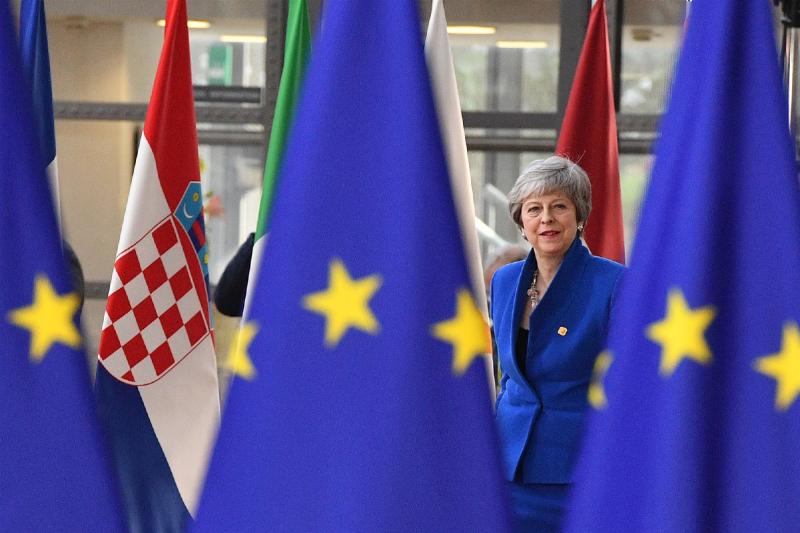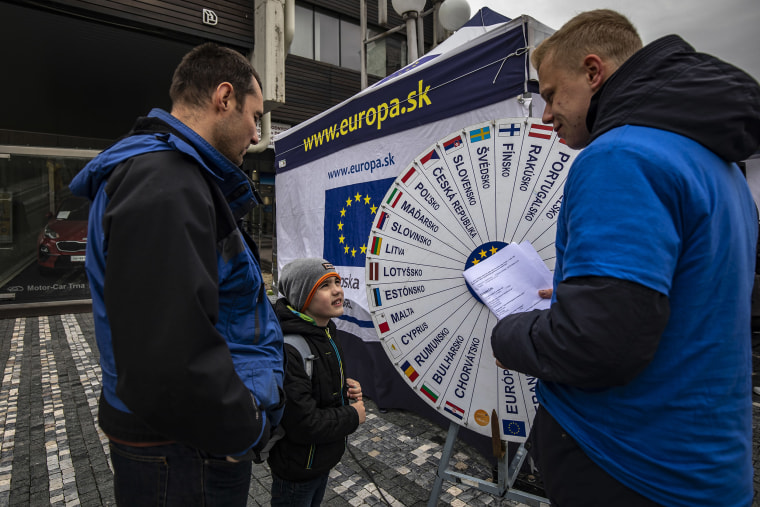Voting has begun in the most divisive E.U. Parliament election in a generation



Voting began Thursday in what could be the most important European Parliament elections in a generation.
All 28 European Union nations are choosing who should sit in the 751 seats of the European Parliament in Strasbourg, which approves the bloc’s budget and passes laws. The process is the second-largest democratic exercise in the world, behind the Indian general election.
Don’t hold your breath, though: While polls are already open in the United Kingdom and the Netherlands, most countries will vote Sunday and the results will likely not be clear until Monday morning.
 A man looks at campaign posters for the upcoming European elections, in Bayonne, southwestern France on May 20, 2019. Voters in each 28 EU nations will choose lawmakers to represent them at the European Parliament over the next five years. Bob Edme / AP
A man looks at campaign posters for the upcoming European elections, in Bayonne, southwestern France on May 20, 2019. Voters in each 28 EU nations will choose lawmakers to represent them at the European Parliament over the next five years. Bob Edme / AP
Why does this matter?
Member nations have their own separate elections to choose their national parliaments and local politicians, but the E.U. Parliament votes on the bloc’s $150 billion annual budget and passes legislation that affects some 500 million people.
And this election comes at a key time for the future of the entire E.U. project.
The 2016 Brexit vote to leave the union shook the E.U to its core and coincided with the growth of right-wing, nationalist parties across the continent.
Charismatic young populist candidates from France , Belgium, Italy and elsewhere are threatening to upset the consensus that the E.U. is a universal force for good.
Not everyone in Europe was keen to welcome refugees from Africa and the Middle East, who began arriving in large numbers in 2015, adding fuel to nativist voices across the bloc.
For the first time, parties that are critical and even opposed to the European project may have a say in how it is run.
As Jordan Bardella, 23, a rising star of Marine Le Pen’s National Rally party in France, told NBC News this week : “We have the opportunity to arrive in force in front of the European Commission and to upturn the table.”
Euroskeptic parties overall are predicted to win about 35 percent of the vote across the continent. Italy’s deputy prime minister, Matteo Salvini — from the far-right Lega Nord party — has already pledged to form a new right-wing caucus within the European Parliament which would push for reforms to limit the E.U.’s power.
Guy Verhofstadt, the European Parliament’s chief Brexit coordinator and a former Belgian prime minister, told CNN on Tuesday of Salvini’s plan: “"Reform? I don't call that reform. I call that the kiss of death. Instead of beating it from outside, it will die inside."

Who’s going to win?
Members of the European Parliament (MEPs) organize themselves into parties, just like in a national parliament or the U.S. Congress, and In the last elections in 2014, the biggest of these was the European People’s Party (EPP), a grouping of various center-right parties from across Europe which has traditionally governed alongside the center-left Socialists & Democrats group, among others.


For every action, there is an equal and opposite reaction?
I wrote about this over 10 years ago on Newsvine, when we encountered personally local BNP members in England's north country. And while the BNP repackaged itself, into Brexit, it seems that a lot of Europe has done so likewise.